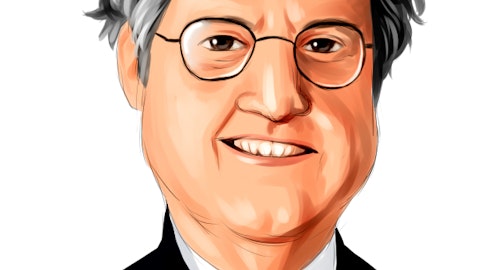Jeff Adelson: Got it. And have you kind of dimensionalized the EPS impact from the potential May 14 date? And I think one of your peers back in COVID had to stop the dividend period. But I’m just wondering, have you thought about whether the lack of earnings for this temporary period might impact the dividend or how to think about that?
Perry Beberman: At this point, I do not see there’s any impact to our dividend. We were in a good place on that, and what we provided was the revenue impact that you can assume will flow through earnings before tax. But, no, I’m not expecting there to be a dividend impact.
Jeff Adelson: Okay, thank you.
Operator: Thank you. Our next question comes from the line of Reggie Smith with JPMorgan. Your line is now open.
Reggie Smith: Hey, good morning, and thanks for taking the question. I appreciate all the disclosure with the different scenarios. My question is, have you guys disclosed what the unmitigated impact would be in the fourth quarter? And then I have a follow-up.
Ralph Andretta: No, we haven’t, because really, the impact is a combination of, obviously, the reduction in late fee to what will be applied, how it flows through the P&L, and all new pricing actions that will flow through because they kind of, they go hand in glove, right. Those will act in tandem.
Reggie Smith: Got it. Understood. And then I was hoping, I guess, kind of switch subjects. I was hoping that you could maybe give a little texture on the spending trends within some of your different pockets. I don’t know if you could talk about maybe what your higher income spending looks like, maybe different FICO scores, co-brand versus private labels. Are there any trends worth calling out there, positive strength, weakness, et cetera?
Ralph Andretta: It’s what you would expect in this type of economy, right? So your prime and prime plus people are spending and they have some spending capacity and you’ll see that. And as you move down the vantage or FICO chain, you see people focusing on more non-discretionary items and they’re focused on budgeting and not overextending themselves. So that’s what we’re seeing. So if you look at a co-brand spend, you’re seeing the co-brand spend is probably on non-discretionary items. And we’re seeing some lower big ticket spend as well.
Reggie Smith: If I could sneak one last one, and there’s a slide on Slide 9, there’s a diagram that shows, obviously, the different FICO buckets. Is there a way, and have you guys disclosed how your losses kind of fall between those different tiers so that the relative weighting. I would imagine, obviously, that the bulk of your losses, or rather the lower FICO bands, represent a disproportionate one, but any color you can provide around that would be helpful as we kind of think about losses in the back half of the year and how that could kind of migrate? Thank you.
Ralph Andretta: I think the – one, no, we don’t provide losses by risk band. Good question, though. And one, though, that I think as you think about the risk bands, it is indicative of what losses you may have in the future. But as I said before, because you think about loss, the risk scores basically drive losses. So as we see improvement in the overall risk scores, that should be indicative of future improvement as well. And some of that will be how risk scores move throughout the cycle. As there’s improvement in the cycle, risk scores will migrate back up. Right now we’re in a period where they’re migrating down despite our risk actions.
Reggie Smith: Okay. Thank you.
Operator: Thank you. Our next question comes from the line of John Pancari with Evercore ISI. Your line is now open.
John Pancari: Good morning. So regarding the impact of the May 14 implementation, I heard your answer to Jeff’s question that should not impact the dividend. Does that mean that you expect that you’ll earn the dividend in 2024 on an after tax bottom-line basis? Because the math initially running the math you gave in your scenario implies that you could be either not earning any money this year or in a net loss and so I just want to get your thoughts there.
Ralph Andretta: Yes. We have a capital plan with approved actions that we can take and flexibility on how we would use that capital. So, again, that is where we’re at, and we do not expect or anticipate the need to reduce the dividend at this point.
John Pancari: Okay. And then just back to that. The – like I said, the initial math is pointing to a possible net loss for the year. Is there something we could be underestimating in running that math that gives you some confidence on the earnings potentially being positive when you run that May 14 scenario?
Ralph Andretta: I’ll give more clarity around that in future discussions. But really, when you think about one of the earlier things I said, we’re going to have a tailwind from the improving losses in the back part of the year. You have improving losses, you have less reversal of interest and fees, and you also will have expected reserve rate reduction throughout the year consistent with our responsible growth. So I think all those things will aid in, I’ll say hopefully not having to post a negative earnings for the year.
John Pancari: Okay. Got it. All right. Thank you.
Operator: Thank you. I’ll now pass it back to Ralph Andretta for closing remarks.
Ralph Andretta: Thank you very much. And thank you all for joining our call today and for your interest in Bread Financial. And we, of course, look forward to speaking with you again next quarter. And everyone, have a terrific day.
Operator: This concludes today’s conference call. Thank you for your participation. You may now disconnect.
Follow Bread Financial Holdings Inc. (NYSE:BFH)
Follow Bread Financial Holdings Inc. (NYSE:BFH)
Receive real-time insider trading and news alerts



